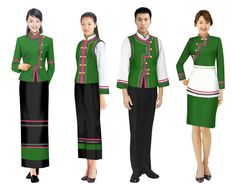As the world continues to grapple with environmental challenges, industries are increasingly shifting towards sustainable practices to reduce their ecological footprint. The hospitality industry, a major player in the global economy, is also embracing eco-conscious initiatives, and one significant step is the adoption of sustainable and eco-friendly uniforms. These uniforms not only align businesses with eco-responsible values but also offer numerous benefits, ranging from reduced environmental impact to enhanced employee well-being.
- Sustainable Fabric Choices
One of the primary aspects of eco-friendly uniforms is the choice of sustainable fabrics. Traditional uniform materials like polyester and nylon are derived from fossil fuels and have significant environmental consequences. However, sustainable alternatives such as organic cotton, hemp, bamboo, and recycled polyester are becoming increasingly popular. These fabrics are biodegradable, require fewer resources to produce, and have a lower carbon footprint.
- Reducing Water and Energy Usage
The production of textiles is known to be water and energy-intensive. By opting for sustainable uniforms, hotels and restaurants can help conserve precious resources. Organic cotton, for instance, requires significantly less water compared to conventional cotton, while fabrics like bamboo and hemp naturally consume less water during growth.
- Minimizing Chemical Usage
Eco-friendly uniforms often involve the use of non-toxic, natural dyes and finishes. These substitutes reduce the release of harmful chemicals into water bodies and promote a healthier working environment for those involved in the manufacturing process. Additionally, choosing fabrics grown without pesticides or synthetic fertilizers contributes to improved soil health and biodiversity.
- Extended Product Lifespan
Sustainable uniforms are typically designed to be durable and long-lasting. The use of quality materials and ethical manufacturing processes ensures that these garments can withstand frequent washing and wear, reducing the need for frequent replacements. This not only saves money for businesses but also decreases the overall environmental impact associated with uniform production.
- Circular Economy Approach
Adopting a circular economy approach involves designing uniforms that can be easily recycled or upcycled at the end of their lifecycle. This means that old uniforms can be transformed into new products, reducing waste and conserving resources. Some companies have started implementing take-back programs, where old uniforms are collected and responsibly repurposed.
- Positive Brand Image
Consumers are becoming increasingly conscious of the environmental impact of the businesses they support. By using sustainable uniforms, hotels and restaurants can attract environmentally-aware customers, enhancing their brand reputation and loyalty.
- Employee Satisfaction and Well-being
Eco-friendly uniforms are often made from natural and breathable fabrics, providing greater comfort to employees, especially those working long hours. Staff satisfaction and morale can improve when they feel that their employers prioritize their well-being and contribute to a healthier environment.
Conclusion
The adoption of sustainable and eco-friendly uniforms in the hospitality industry marks a significant step towards a greener future. By choosing fabrics and manufacturing processes that are kinder to the planet, hotels and restaurants can play a crucial role in conservation efforts. These uniforms not only benefit the environment by reducing waste and resource consumption but also contribute to a positive brand image and promote employee well-being. As sustainability becomes an increasingly vital aspect of business practices, eco-friendly uniforms are set to become the norm, revolutionizing the way the hospitality industry dresses its staff.






